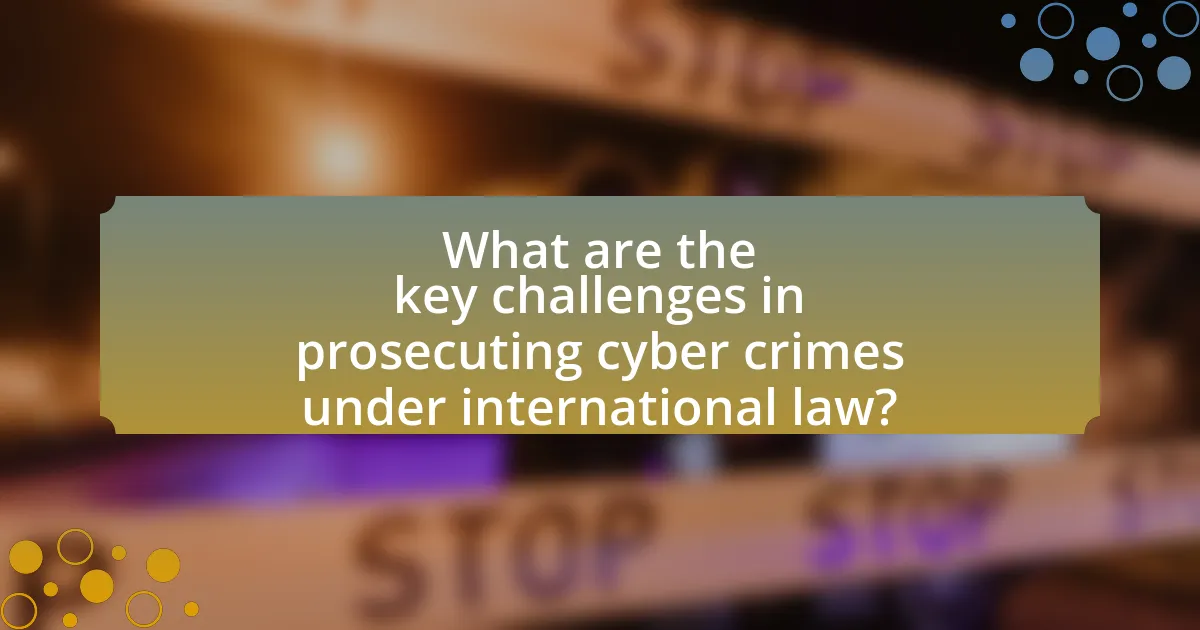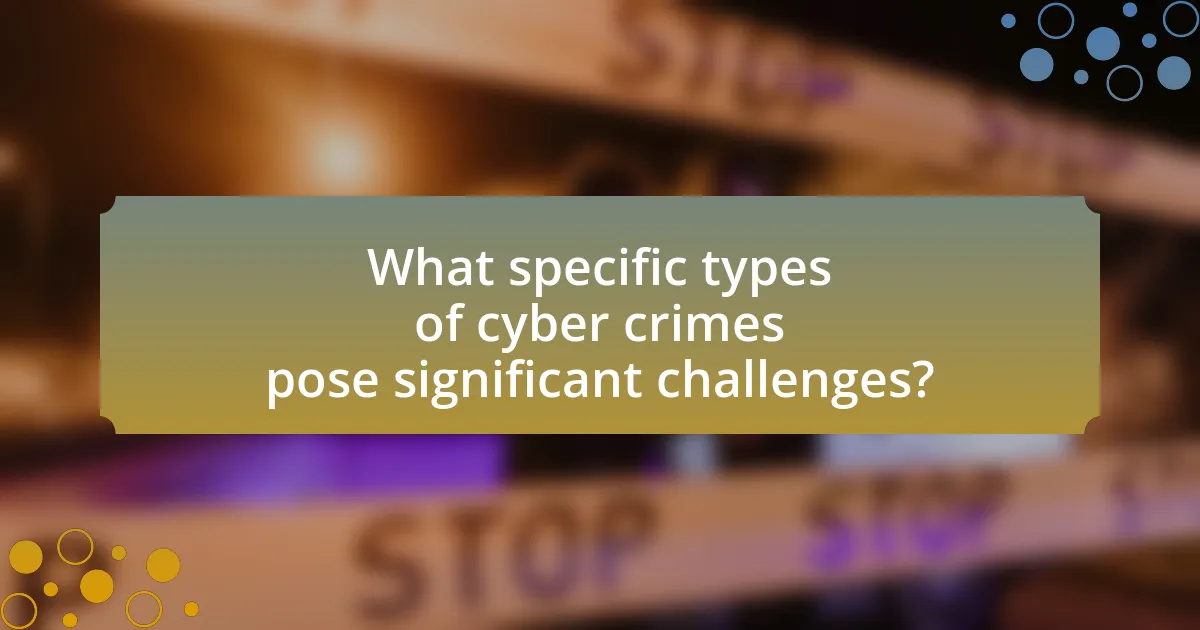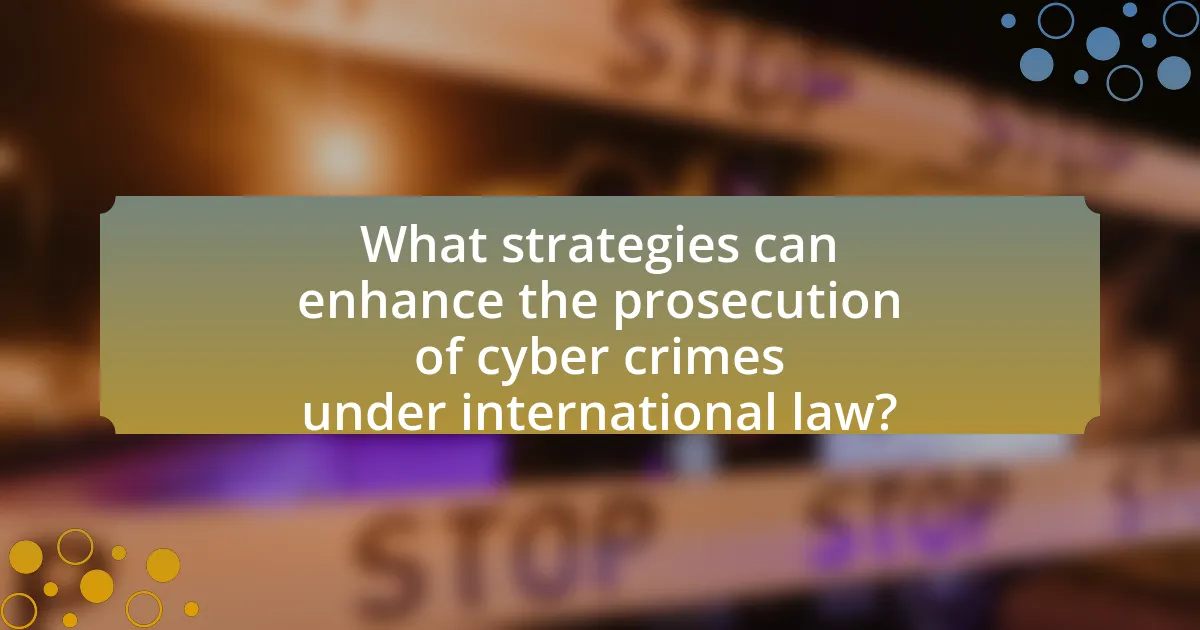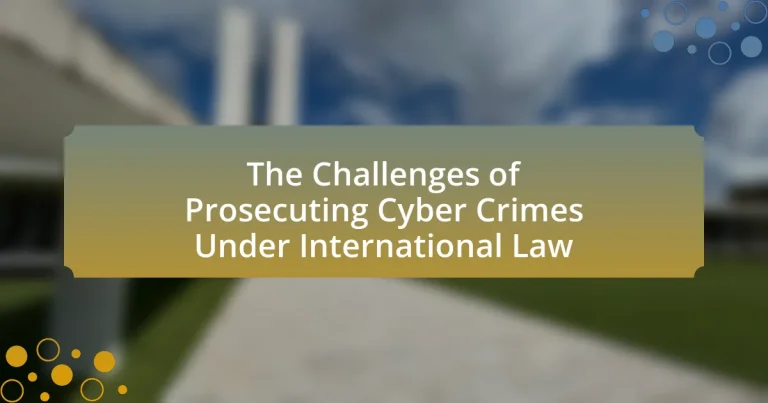The main entity of the article is the prosecution of cyber crimes under international law. The article outlines the key challenges faced in this area, including jurisdictional issues, the anonymity of perpetrators, and the rapid evolution of technology. It discusses how these challenges complicate the enforcement of laws and the prosecution of offenders, highlighting the need for international cooperation and harmonization of legal frameworks. Additionally, the article examines specific types of cyber crimes, such as ransomware and identity theft, and the unique difficulties they present in legal contexts, emphasizing the importance of evidence collection and the role of public-private partnerships in enhancing prosecution efforts.

What are the key challenges in prosecuting cyber crimes under international law?
The key challenges in prosecuting cyber crimes under international law include jurisdictional issues, the anonymity of perpetrators, and the rapid evolution of technology. Jurisdictional issues arise because cyber crimes often cross national borders, complicating the enforcement of laws and the prosecution of offenders. The anonymity of perpetrators, facilitated by the internet, makes it difficult to identify and apprehend individuals responsible for cyber crimes. Additionally, the rapid evolution of technology outpaces existing legal frameworks, leading to gaps in legislation that hinder effective prosecution. These challenges are supported by the fact that, according to the United Nations Office on Drugs and Crime, only a small percentage of cyber crimes are reported and even fewer lead to successful prosecutions, highlighting the systemic difficulties in addressing these offenses.
How do jurisdictional issues complicate cyber crime prosecutions?
Jurisdictional issues complicate cyber crime prosecutions by creating ambiguity over which legal authority has the right to prosecute offenders. Cyber crimes often involve perpetrators, victims, and servers located in different countries, leading to conflicts between national laws and varying definitions of criminal behavior. For instance, the lack of a universal legal framework means that actions considered illegal in one jurisdiction may not be recognized as such in another, complicating extradition processes and cooperation among law enforcement agencies. According to the United Nations Office on Drugs and Crime, the transnational nature of cyber crime necessitates international collaboration, yet differing legal standards hinder effective prosecution and enforcement.
What factors determine jurisdiction in cyber crime cases?
Jurisdiction in cyber crime cases is determined by several key factors, including the location of the offender, the location of the victim, and the location of the server used in the crime. The principle of territoriality asserts that a state has jurisdiction if the crime occurs within its borders, regardless of the nationality of the offender or victim. Additionally, the nationality of the offender can grant jurisdiction to their home country, even if the crime was committed abroad. Furthermore, if the cyber crime affects individuals or entities in a specific jurisdiction, that jurisdiction may also claim authority to prosecute. These factors are supported by international legal frameworks, such as the Budapest Convention on Cybercrime, which encourages cooperation among states in addressing cross-border cyber crime issues.
How do different countries’ laws impact jurisdictional challenges?
Different countries’ laws significantly impact jurisdictional challenges by creating inconsistencies in legal frameworks that govern cyber crimes. For instance, variations in data protection laws, such as the General Data Protection Regulation in the European Union versus more lenient regulations in other regions, complicate cross-border investigations and prosecutions. These discrepancies can lead to conflicts over which country’s laws apply, as seen in cases where a cyber crime affects victims in multiple jurisdictions. Additionally, differing definitions of cyber crimes and varying penalties can hinder cooperation between law enforcement agencies, making it difficult to establish jurisdiction. The lack of a unified international legal standard further exacerbates these challenges, as countries may prioritize their national laws over international agreements, resulting in fragmented enforcement efforts.
What role does evidence collection play in prosecuting cyber crimes?
Evidence collection is crucial in prosecuting cyber crimes as it provides the necessary data to establish the occurrence of a crime and identify the perpetrator. Effective evidence collection involves gathering digital footprints, logs, and other electronic data that can link suspects to criminal activities. For instance, a study by the European Union Agency for Cybersecurity highlights that 90% of successful cyber crime prosecutions rely on digital evidence, demonstrating its significance in legal proceedings. This evidence not only supports the case in court but also helps in meeting the legal standards required for prosecution under international law, which often necessitates clear and verifiable proof of wrongdoing.
What are the difficulties in gathering digital evidence across borders?
Gathering digital evidence across borders presents significant difficulties due to varying legal frameworks, jurisdictional issues, and data privacy laws. Different countries have distinct laws governing the collection and admissibility of digital evidence, which complicates cooperation between law enforcement agencies. For instance, the European Union’s General Data Protection Regulation (GDPR) imposes strict rules on data transfer, impacting the ability to access evidence stored in EU jurisdictions. Additionally, jurisdictional challenges arise when determining which country’s laws apply, leading to potential conflicts and delays in investigations. These complexities hinder timely and effective prosecution of cyber crimes on an international scale.
How do variations in legal standards affect evidence admissibility?
Variations in legal standards significantly affect evidence admissibility by determining the criteria under which evidence is considered reliable and relevant in court. Different jurisdictions may apply distinct rules, such as the “Frye standard” or the “Daubert standard,” which influence how scientific evidence is evaluated. For instance, the Daubert standard, used in federal courts, requires that evidence be both relevant and reliable, focusing on the methodology and principles underlying the evidence. In contrast, the Frye standard, prevalent in some state courts, only requires that the evidence be generally accepted within the relevant scientific community. These differing standards can lead to inconsistencies in how evidence is treated across jurisdictions, impacting the outcomes of cases involving cyber crimes, where the admissibility of digital evidence can hinge on these legal interpretations.
Why is international cooperation crucial in cyber crime prosecutions?
International cooperation is crucial in cyber crime prosecutions because cyber crimes often transcend national borders, making it difficult for individual countries to effectively investigate and prosecute offenders. The global nature of the internet allows criminals to operate from jurisdictions that may not have stringent laws or enforcement mechanisms, complicating legal proceedings. For instance, the 2017 WannaCry ransomware attack affected over 200,000 computers across 150 countries, highlighting the need for collaborative efforts among nations to share intelligence and resources. Additionally, treaties like the Budapest Convention on Cybercrime facilitate international cooperation by providing a legal framework for mutual assistance in investigations and prosecutions, thereby enhancing the ability to hold cyber criminals accountable.
What are the barriers to effective international collaboration?
Barriers to effective international collaboration include differing legal frameworks, lack of trust among nations, and inadequate communication channels. Differing legal frameworks create challenges as countries have varying laws regarding cyber crimes, which complicates prosecution efforts. Lack of trust among nations can hinder information sharing and joint operations, as countries may fear that sensitive data could be misused. Inadequate communication channels further exacerbate these issues, as the absence of established protocols can lead to delays and misunderstandings in collaborative efforts. These barriers significantly impede the ability to effectively address and prosecute cyber crimes on an international scale.
How can treaties and agreements enhance cooperation in cyber crime cases?
Treaties and agreements enhance cooperation in cyber crime cases by establishing a legal framework for collaboration among nations. These legal instruments facilitate information sharing, mutual legal assistance, and coordinated law enforcement efforts, which are essential in addressing the transnational nature of cyber crime. For instance, the Budapest Convention on Cybercrime, adopted in 2001, provides guidelines for international cooperation, enabling countries to request and provide assistance in investigations and prosecutions. This treaty has been signed by over 60 countries, demonstrating its effectiveness in fostering a unified approach to combat cyber crime across borders.

What specific types of cyber crimes pose significant challenges?
Significant challenges in cyber crimes include ransomware attacks, identity theft, and phishing schemes. Ransomware attacks, which involve encrypting a victim’s data and demanding payment for decryption, have surged, with a 150% increase reported in 2020 alone, according to the Cybersecurity and Infrastructure Security Agency. Identity theft, where personal information is stolen to commit fraud, affects millions annually, with the Federal Trade Commission reporting over 1.4 million identity theft cases in 2020. Phishing schemes, which deceive individuals into providing sensitive information, have become increasingly sophisticated, with a 220% rise in phishing attacks noted in 2021 by the Anti-Phishing Working Group. These types of cyber crimes complicate prosecution due to jurisdictional issues, the anonymity of perpetrators, and the rapid evolution of technology.
How do financial cyber crimes differ from other types?
Financial cyber crimes primarily differ from other types of cyber crimes in their focus on monetary gain through illegal activities, such as fraud, identity theft, and hacking into financial systems. Unlike other cyber crimes that may target personal data for various reasons, financial cyber crimes specifically aim to exploit financial systems and assets, resulting in direct economic loss. For instance, the FBI reported that in 2020, losses from business email compromise scams alone exceeded $1.8 billion, highlighting the significant financial impact of these crimes compared to other cyber offenses. This distinction underscores the unique challenges in prosecuting financial cyber crimes, as they often involve complex financial transactions and cross-border elements that complicate jurisdiction and enforcement under international law.
What are the unique challenges in prosecuting financial cyber crimes?
Prosecuting financial cyber crimes presents unique challenges primarily due to the complexity of digital evidence and jurisdictional issues. Digital transactions often cross international borders, complicating the legal framework for prosecution, as different countries have varying laws regarding cyber crimes. Additionally, the anonymity provided by the internet makes it difficult to identify and apprehend perpetrators, as evidenced by the rise of cryptocurrencies that obscure financial trails. Furthermore, the rapid evolution of technology outpaces legal systems, making it challenging for law enforcement to keep up with new methods of cyber crime. These factors collectively hinder effective prosecution and enforcement of laws against financial cyber crimes.
How do cyber fraud schemes exploit international boundaries?
Cyber fraud schemes exploit international boundaries by leveraging differences in legal jurisdictions and enforcement capabilities. Criminals often operate from countries with lax regulations or weak law enforcement, making it difficult for victims in other nations to seek justice. For instance, a report by the United Nations Office on Drugs and Crime highlights that cybercriminals frequently use anonymizing technologies and cryptocurrencies to obscure their identities and locations, complicating international cooperation in investigations. This exploitation of jurisdictional gaps allows cyber fraud to proliferate across borders, undermining the effectiveness of national laws and international treaties aimed at combating such crimes.
What challenges arise from cyber terrorism and its prosecution?
Cyber terrorism presents significant challenges in both its execution and prosecution. One major challenge is the anonymity of perpetrators, as cybercriminals can easily mask their identities and locations using various technologies, making it difficult for law enforcement to trace and apprehend them. Additionally, the jurisdictional issues complicate prosecution, as cyber attacks can originate from one country and target another, leading to legal ambiguities regarding which nation’s laws apply. Furthermore, the rapid evolution of technology outpaces existing legal frameworks, leaving gaps in international law that hinder effective prosecution. According to a report by the United Nations Office on Drugs and Crime, the lack of standardized definitions and laws regarding cyber terrorism further complicates international cooperation in prosecuting these crimes.
How does the definition of cyber terrorism vary internationally?
The definition of cyber terrorism varies internationally due to differing legal frameworks, cultural contexts, and governmental priorities. For instance, the United States defines cyber terrorism as politically motivated attacks that disrupt critical infrastructure, while the European Union emphasizes the impact on public safety and security. In contrast, countries like China focus on the preservation of state security, which can lead to broader interpretations that include dissent against the government. These variations complicate international cooperation in prosecuting cyber crimes, as differing definitions can hinder consensus on what constitutes a prosecutable offense.
What legal frameworks exist to address cyber terrorism?
Legal frameworks addressing cyber terrorism include the Council of Europe’s Convention on Cybercrime, also known as the Budapest Convention, which provides a comprehensive legal framework for international cooperation in combating cybercrime, including acts of cyber terrorism. Additionally, the United Nations has established various resolutions and initiatives, such as the UN Global Counter-Terrorism Strategy, which emphasizes the need for member states to enhance their legal frameworks to combat terrorism in all its forms, including cyber-related threats. Furthermore, national laws in countries like the United States, through the USA PATRIOT Act and the Cybersecurity Information Sharing Act, specifically address cyber terrorism by defining it and establishing penalties for related offenses. These frameworks collectively aim to facilitate international cooperation, enhance legal definitions, and provide mechanisms for prosecution and prevention of cyber terrorism.
Why are data breaches particularly challenging to prosecute?
Data breaches are particularly challenging to prosecute due to the complexities of jurisdiction, the anonymity of perpetrators, and the technical nature of the crimes. Jurisdictional issues arise because data breaches often involve multiple countries, making it difficult to determine which legal system has authority. The anonymity of cybercriminals, facilitated by the use of the dark web and sophisticated encryption methods, complicates identification and attribution. Additionally, the technical aspects of data breaches require specialized knowledge for investigation and prosecution, which many law enforcement agencies may lack. These factors collectively hinder effective legal action against those responsible for data breaches.
What legal implications arise from data privacy laws in different jurisdictions?
Data privacy laws in different jurisdictions create varied legal implications, primarily affecting compliance, enforcement, and liability. For instance, the General Data Protection Regulation (GDPR) in the European Union imposes strict requirements on data handling, including the necessity for explicit consent and the right to data portability, which can lead to significant penalties for non-compliance, such as fines up to 4% of annual global turnover. In contrast, the California Consumer Privacy Act (CCPA) offers consumers rights regarding their personal information but has different enforcement mechanisms and penalties, reflecting a less stringent approach compared to GDPR. These differences can complicate international business operations, as companies must navigate a patchwork of regulations, potentially leading to legal disputes and increased operational costs. The legal implications also extend to cross-border data transfers, where jurisdictions may impose restrictions that affect global data flows, thereby impacting international trade and cooperation in cybercrime prosecution.
How do companies’ responses to breaches affect prosecution efforts?
Companies’ responses to breaches significantly impact prosecution efforts by influencing the availability of evidence and the willingness of victims to cooperate. When companies promptly report breaches and collaborate with law enforcement, they facilitate the collection of crucial digital evidence, which is essential for building a strong case against perpetrators. For instance, a study by the Ponemon Institute found that organizations that share breach information with authorities increase the likelihood of successful prosecutions. Conversely, if companies choose to conceal breaches or fail to provide necessary information, it hampers investigations and reduces the chances of holding offenders accountable. Thus, proactive and transparent responses from companies are vital for effective prosecution in cybercrime cases.

What strategies can enhance the prosecution of cyber crimes under international law?
Enhancing the prosecution of cyber crimes under international law can be achieved through the establishment of comprehensive legal frameworks, improved international cooperation, and the development of specialized training for law enforcement. Comprehensive legal frameworks, such as the Budapest Convention on Cybercrime, provide a basis for harmonizing laws across jurisdictions, facilitating prosecution. Improved international cooperation, exemplified by initiatives like INTERPOL’s Cybercrime Unit, enables information sharing and joint operations, which are crucial for addressing transnational cyber threats. Additionally, specialized training programs for law enforcement agencies, focusing on cyber forensics and legal procedures, equip officers with the necessary skills to effectively investigate and prosecute cyber crimes, thereby increasing the likelihood of successful legal outcomes.
How can law enforcement agencies improve their capabilities?
Law enforcement agencies can improve their capabilities by enhancing training programs focused on cybercrime investigation techniques. Specialized training equips officers with the necessary skills to understand and combat the complexities of cyber offenses, which have increased significantly in recent years. For instance, the FBI’s Cyber Crime Division reported a 300% increase in reported cybercrime incidents from 2019 to 2021, highlighting the urgent need for improved skills in this area. Additionally, collaboration with technology companies and international law enforcement can facilitate knowledge sharing and access to advanced tools, further strengthening their operational effectiveness against cyber threats.
What training and resources are necessary for effective cyber crime units?
Effective cyber crime units require specialized training in digital forensics, cybersecurity protocols, and legal frameworks governing cyber crimes. Training programs should include hands-on experience with tools for data recovery, malware analysis, and network security, as well as knowledge of international laws such as the Budapest Convention on Cybercrime, which provides a legal basis for cooperation among countries. Resources necessary for these units include access to advanced technology for monitoring and investigating cyber threats, collaboration with private sector cybersecurity firms, and continuous education to stay updated on evolving cyber threats and legal standards.
How can technology aid in the prosecution of cyber crimes?
Technology aids in the prosecution of cyber crimes by providing advanced tools for evidence collection, analysis, and tracking of digital activities. For instance, forensic software can recover deleted files and analyze data from devices, while network monitoring tools can trace the origins of cyber attacks. Additionally, technologies such as blockchain can enhance the integrity of digital evidence, making it more reliable in court. According to a report by the International Association of Chiefs of Police, the use of technology in investigations has led to a 30% increase in successful prosecutions of cyber crimes. This demonstrates that leveraging technology not only streamlines the investigative process but also strengthens the legal framework for prosecuting offenders.
What role do public-private partnerships play in combating cyber crime?
Public-private partnerships play a crucial role in combating cyber crime by facilitating collaboration between government entities and private sector organizations to enhance cybersecurity measures. These partnerships enable the sharing of critical information, resources, and expertise, which is essential for identifying and mitigating cyber threats effectively. For instance, initiatives like the Cybersecurity Information Sharing Act in the United States encourage private companies to share threat intelligence with government agencies, leading to a more coordinated response to cyber incidents. Additionally, public-private partnerships often result in joint training programs and exercises that improve the overall readiness of both sectors to tackle cyber threats, as evidenced by the collaboration between the FBI and various tech companies to address ransomware attacks.
How can collaboration between governments and tech companies enhance prosecution efforts?
Collaboration between governments and tech companies can enhance prosecution efforts by facilitating the sharing of critical data and resources necessary for investigating cyber crimes. When governments partner with tech companies, they gain access to advanced technologies and expertise that can help identify and track cybercriminals more effectively. For instance, in 2020, the FBI collaborated with tech firms to dismantle a major ransomware operation, demonstrating how such partnerships can lead to successful prosecutions. Additionally, tech companies can provide law enforcement with real-time data analytics and threat intelligence, which are essential for building strong cases against offenders. This synergy not only improves the efficiency of investigations but also strengthens the legal framework surrounding cyber crime prosecution, making it more robust against evolving threats.
What best practices can be adopted from successful partnerships?
Successful partnerships in the context of prosecuting cyber crimes under international law can adopt best practices such as establishing clear communication channels, defining roles and responsibilities, and fostering mutual trust. Clear communication ensures that all parties are aligned on objectives and strategies, which is crucial given the complexity of international legal frameworks. Defining roles and responsibilities helps to avoid overlaps and gaps in efforts, enhancing efficiency in investigations and prosecutions. Fostering mutual trust among partners encourages information sharing and collaboration, which are essential for addressing the transnational nature of cyber crimes. These practices are supported by case studies showing that effective partnerships, such as those formed through international law enforcement coalitions, have led to successful prosecutions and enhanced global cooperation in combating cyber threats.
What practical steps can countries take to strengthen their legal frameworks?
Countries can strengthen their legal frameworks by adopting comprehensive cybercrime legislation that aligns with international standards. This includes implementing laws that define cybercrimes clearly, establish jurisdiction, and outline penalties. For instance, the Budapest Convention on Cybercrime serves as a model for countries to develop their legal frameworks, promoting cooperation and harmonization of laws across borders. Additionally, countries should invest in training law enforcement and judicial personnel on cybercrime issues, ensuring they are equipped to handle complex cases effectively. Establishing public-private partnerships can also enhance information sharing and resource allocation, further bolstering legal responses to cyber threats.
How can countries harmonize their laws to facilitate prosecution?
Countries can harmonize their laws to facilitate prosecution by establishing international treaties that create standardized legal frameworks for cybercrime. Such treaties, like the Budapest Convention on Cybercrime, provide guidelines for member states to align their laws on issues such as jurisdiction, evidence sharing, and mutual legal assistance. This alignment is crucial as it enables countries to effectively cooperate in investigations and prosecutions across borders, addressing the challenges posed by the global nature of cybercrime. For instance, the Budapest Convention has been signed by over 60 countries, demonstrating a collective commitment to harmonizing laws and enhancing collaborative efforts in prosecuting cybercriminals.
What are the benefits of adopting international legal standards for cyber crimes?
Adopting international legal standards for cyber crimes enhances global cooperation, improves legal clarity, and strengthens enforcement mechanisms. These standards facilitate cross-border collaboration among law enforcement agencies, allowing for more effective investigation and prosecution of cybercriminals who operate across jurisdictions. For instance, the Budapest Convention on Cybercrime, which has been ratified by numerous countries, provides a framework for international cooperation and mutual assistance in combating cybercrime. This legal alignment helps to close gaps that cybercriminals exploit, thereby increasing the overall effectiveness of legal responses to cyber threats.


